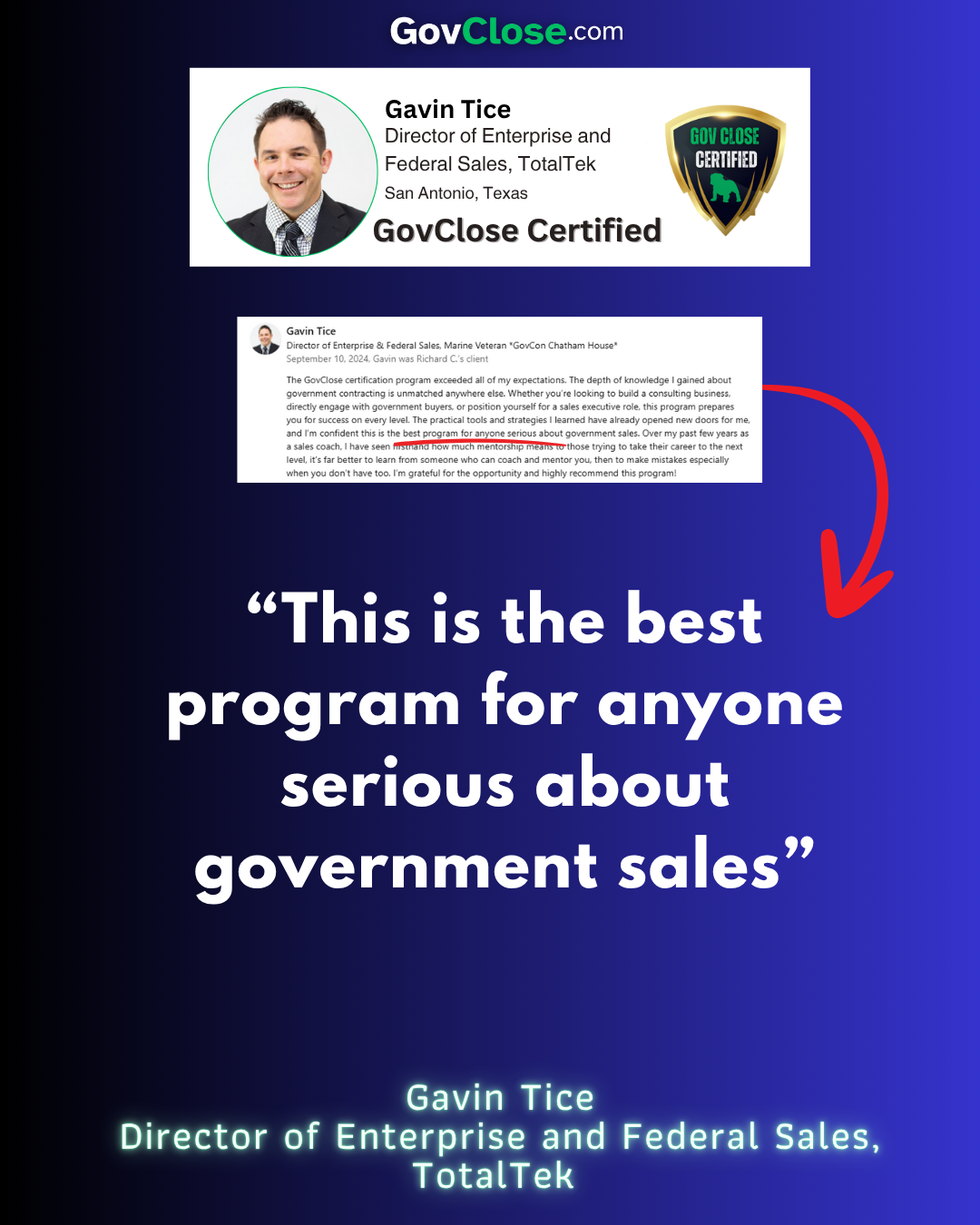
Sub Contracting: When is this a Good Strategy? (Podcast Transcript)
Aug 27, 2022[01:12] Richard C. Howard: Hey, guys, Richard here with government sales momentum. Thanks for tuning in to this podcast video. Today I'm going to cover a very important aspect to selling to the government and that is subcontracting. Now you're going to see most businesses that are continuing to sell to the government when they're doing it over the years, whether large or small. Usually some contracting is one of their strategies and that makes sense for a lot of companies. There are a few areas where it might not. But I'm going to cover in this podcast three reasons why you would consider subcontracting and going after those types of contracts. I'll cover in another podcast the strategies that I've used with my clients to become a subcontractor inform teaming relationships with other companies. There are a lot of strategies involved with that and I think that's saved for another podcast. But here let's discuss why. So I think the prime reason that you would consider subcontracting is you see an RFP come down or solicitation of some sort, even maybe before that, maybe you see an RFI drop or a source of salt notification and maybe 30% of the requirements that they're looking for is what you specialize in, whether it's software development or user experience, design or construction, you name it. Cyber security, there might be a piece there that you really focus in, but you'll see that that's lumped in with a much larger contract that has all the requirements in it. And that's done for a lot of reasons, mainly because on the government side, when I was in acquisitions for the Department of Defense, putting an RFP out there and going through the contracting process is a lot of work. So if you can put one big contract out there, that covers a lot of different things that can reduce the workload.
On the government side, unfortunately, on the small business side, it could create more work for you, right? So you know that you can't cover all of the things the government is asking for, but you do one really well. That is an instance where you would consider subcontracting and really like I said, I'll cover this in another episode. But one really great strategy if you find yourself in that boat is you take that solicitation, you take that request for proposal RFI, source of sought and then you go find another company with that. So having an opportunity and approaching another company that can do the rest of that work is a great way to form a teaming relationship. So that's one you can't do all the work. Another reason you might consider subcontracting is you see that solicitation come out, right? And it is exactly what you do. It is perfect for your business. But then you see that they have already set it aside for maybe a veteran owned small business or hub Zone or a and you don't fit that category. So if it's already set aside for a certain sub tier of small business that you don't fit, that's not a reason to walk away from it. That is an opportunity for you to subcontract with another company.
Same strategy I would recommend on that, take that opportunity and then if it's reserved for eight a go find some eight companies that could do that work and say look, I've got this great opportunity, we could do a piece of it. You could do a piece of it, what do you think? So that's number two. And the third, and this is not an all exhaustive list, but you will see solicitations that are intended for GWAC or large IDIQ, government wide acquisitions contracts, these large contracts. What I mean by that is if you take a look at contracts like NASA Soup for instance, that would be a large GWAC, a large contract that is competed ahead of time where many companies almost like an RFP, right? So you'll see a Solicitation for a GWAC or a large It IQ and a bunch of companies, let's say it's for It services and software development and a few other things you might have a couple of hundred companies apply to beyond that contract vehicle and you go through the year long process and maybe it's down selected to 30 companies, right? Well, those companies aren't necessarily making any money, they're just on this vehicle. That vehicle allows the government to put delivery orders on those companies very quickly without having to go through a long process of competition because they've already competed to be on that contract. So often you'll see a perfect opportunity for your company but you'll see that it's already set aside for a contract vehicle. So hey, we intend to award this on NASA Soup or you might find out about an opportunity that's just going to be awarded on GSA. So those are other opportunities for you to reach out to companies that are either on the big contract vehicles or on GSA and say, hey, look, we've got this opportunity. We know it's coming up. We're really great at it. You're on the vehicle. Let's potentially form a teaming relationship and go after that. There are lots of ways to find out if companies are on these types of vehicles, but probably the main one is just the Google machine, right? So you could Google some of the big contract vehicles and see what companies are on there. And then often just additionally, if the same contracting vehicles are coming up within your category, that might be an indication that you want to be on some of those. And if you look at companies that are selling over the years, you'll see that they start accumulating things like a GSA Schedule or a NASA Soup or CIO SP Three, or whatever the case may be, whatever fits their particular niche or specialty, they start accumulating these vehicles, which just make it easier for the government to hire them. And that's called category management. That is definitely a topic for another episode. But those are three areas where you could consider subcontracting very important, because a lot of companies will see one of those three categories come up and maybe just say, oh, this opportunity is not right for me. But I think a better perspective on that is this is an opportunity to partner with another company, and that also has a lot of benefits.
So what I've seen is when we put two companies together and they're working together, going after subcontracting opportunities, a couple of months down the line, the other company might find a new opportunity, and then they'll bring it, and you can go back and forth priming. You can take turns priming and subbing, depending on the relationship. So, again, just some thoughts on subcontracting, and hopefully that helps you. If you have any questions, feel free to reach out. We're Dodcontract.com and you can find us on our podcast on most of your major podcast hosts. All right, take care.
[07:56] Richard C. Howard: I hope you enjoyed this episode of government sales momentum. If you did enjoy the episode, please subscribe to the podcast and leave a review. It's very much appreciated. If you're interested in selling products and services to the Department of Defense, I have something for you that you're not going to find anywhere else in the world. The team and I created a program that takes everything you need to win defense contracts and put it into one place. Up until now, only large defense companies and a small amount of people in the know have had access to how products and services are really sold to the Department of Defense. I've taken all of that information and put it in a step-by-step training module that shows you how to consistently sell to the US. Military. If you join our membership, not only do you get the model? But you get weekly sessions with former DOD acquisitions officers for training and guidance to answer your questions and a community of like-minded business owners that want to partner on different opportunities to bid for subcontracting and teaming or just to discuss general strategy on how to sell to the DOD. You'll have access to every course I've created. Every coaching session I've ever recorded in every interview with an acquisition professional that I've ever conducted. And we cover topics that range from defense sales planning and competitor analysis to SBIR STTR Foreign military sales. The list goes on. Go to Dodcontract.com if you are interested, and I would love to see you in the membership.
You can also check out our blog about Meeting Quotas with Government Contracts to learn more about methods and opportunities you can use to help you with this Struggle.
If you have any questions, feel free to reach out here and we will get back to you as soon as we can. Thanks.
Turn Government Contracting Knowledge Into Income
This isn’t a course. It’s a certification and implementation system to help you build a consulting business, land a high-paying sales role, or scale your own company in federal contracting.
We hate SPAM. We will never sell your information, for any reason.


